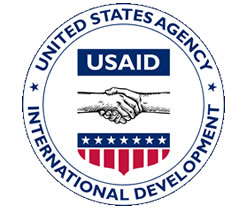 The USAID through its Agriculture Technology Transfer Project (ATT) on Thursday handed over 22 ‘seed vans’ to selected seed processors and agro-dealers from the Upper East, Upper West and Northern Regions to facilitate the sale of certified seeds to farmers.
The USAID through its Agriculture Technology Transfer Project (ATT) on Thursday handed over 22 ‘seed vans’ to selected seed processors and agro-dealers from the Upper East, Upper West and Northern Regions to facilitate the sale of certified seeds to farmers.
The vans would assist seed producers and agro-input dealers in reaching 120,000 most remote farming communities in northern Ghana, to mitigate challenges farmers in these communities face accessing high-yielding and quality rice, soybean and maize seeds.
The Northern Regional Minister, Mr Salifu Saeed, and USAID/Ghana Deputy Mission Director, Steven Hendrix, both gave out the 22 seed vans at the Seventh Pre-Season Planning and Networking Forum held in Tamale on Thursday.
The event, which was sponsored by Afgri, Eckobank Ghana limited and Africarice, brought together over 800 government officials, farmers, agribusiness, processors, agro-input dealers, seed companies, and producers from across the country to build partnership, establish market linkages, share lesson learned and coordinate planning for the upcoming season.
Speaking at the presentation ceremony on the theme; “Northern Ghana- Open for Agribusiness Investment”, the Northern Regional Minister, Mr Salifu Saaed challenged the beneficiaries to be the hope to farmers and prove to the development partners especially USAID that the investment in the seed sector will be a benefit to all farmers.
He charged them to use the vans for the intended purposes and challenged the beneficiaries to live up to expectation.
Mr Steven Hendrix, USAID/Ghana Deputy Mission Director, said the event was an important forum for catalyzing agriculture-led economic growth and that hundreds of Ghanaian agribusinesses had been linked to local and international markets and fostered partnerships between farmers and agribusinesses.
He noted that through Feed the Future, the U.S. Government’s global hunger and food security initiative, USAID works with the Government of Ghana and development partners to improve the competitiveness of the maize, rice and soybean value chains.
He revealed that since the year 2013, the USAID has facilitated the training of 140,000 farmers on new technologies, help them gain access to inputs, and linked them to markets to sell their produce.
“As a result, they have more than doubled their incomes. The 2015 population-based survey confirmed that our activities are making an impact-it showed poverty levels have declined and agricultural sales have increased. The efforts are attributed to all development partners in the north, not only USAID,” he mentioned.
He said Ghana, being one of the countries benefiting from the initiative has introduced new agricultural technologies and techniques that boost productivity, strengthening agricultural research, linking farmers and agribusiness to markets, and stimulating private sector in the three northern regions.
Mr Thomas Havor, the National Coordinator of the National Seed Trade Association of Ghana (NASTAG), appealed to government and donor agencies to assist farmers to fight against the increasing invasion of what he termed, “Fall Army worms” in their farms.
Dr. Gary Mullins, Chief of Party of the ATT Project said with technical and financial assistance, already a total of 2,162 metric tons of improved certified seed have been produced by local seed companies, and are ready to be marketed during 2017 cropping season, having successfully undergone and passed stringent government certification processes.
The ATT Project works closely with the National Seed Trade Association of Ghana (NASTAG), the Ghana Seed Inspection Unit (GSIU), and local seed producers to make certified seeds available to farming communities where the seed is needed.
The project is targeting that during the 2018 cropping season, 40 per cent of total cropped area for maize, rice and soybean will be sown with certified seeds of improved varieties and it is expected to contribute to increased crop productivity and food security among smallholder farmers.
Source: GNA























